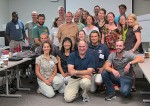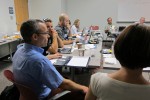There were lots of handshakes, hugs, and talk about science, ecology, and climate change during the first Long Term Ecological Research (LTER) Site Communicators Training Workshop at the LTER Network Office in Albuquerque, NM, earlier this summer. It was a milestone event that brought together participants from at least 17 LTER sites and the Network Office.
When most of the participants trekked from their rooms in the historic Hotel Andaluz in downtown Albuquerque to our first training session at the University of New Mexico, almost everyone in the group was wondering what was in store for them that morning. but at the end of that and subsequent days, we had all gained a trove of new information, science communication techniques, contacts, and training materials —along with ideas for new projects to develop together in this ongoing venture.
A few highlights from the training workshop:
- Chief trainer Steve Davis offered three training modules spanning effective communication strategies for decision makers and managers, stakeholders, and media.
- McOwiti Thomas' (LNO) highlight of current LTER Network communication practices sparked a lively discussion on strategies for increasing our science communication.
- Clarisse Hart’s (Harvard Forest LTER) media messaging exercise helped us identify key messaging points for different audiences and media.
- Julie Doll’s (Kellogg Biological Station LTER) “fish tank” method of communicating with stakeholders provided site communicators with a framework for communicating with targeted audiences.
- Marcia Nation (Central Arizona-Phoenix LTER) led a well-executed triangle square and circle summary of our workshop training that several site communicators have implemented following the workshop.
While each of our individual sites has unique capabilities and programs of research, and therefore see and experience the world differently as it changes before us, as a network we are a massive wealth of information, programs, and resources. The main purpose of the workshop was, therefore, to bring together our science communicators to learn from each other and exchange ideas on best communication practices and skills that will enable us collectively to better identify our greatest strengths and our clearest science messages and then share these with the whole world. In fact we have just begun our quest for sharing, networking, and building bridges into the future for understanding our seminal role in communicating LTER science.
For more information about the workshop or to request materials from the workshop please email drskdailey@gmail.com or visit the LTER intranet to read the Workshop report dated September 30, 2013.

 Enlarge this image
Enlarge this image
